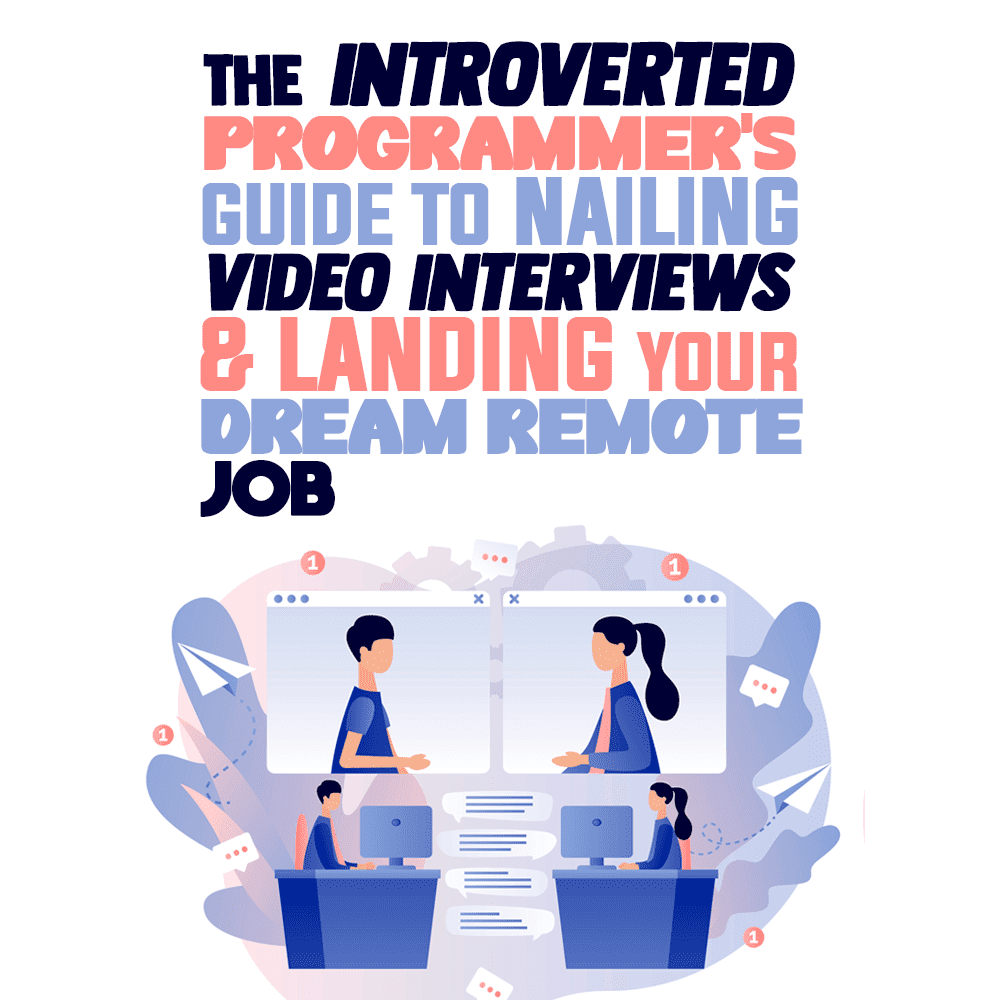
How you're physically perceived isn't even important in your line of work. Your job is to write code, debug it, and make sure it's functional. Why do you need to look presentable and please interviewers to get hired? Isn't your extensive resume and portfolio enough to prove that you can do the job well?
I hear you; it’s stressful and it feels unfair.
The good news, however, is that you can nail any job interview with preparation and practice.
Even better, as more companies start to offer remote positions, entry barriers are lowering, giving you more opportunities than ever before. So if you have the right resources at your disposal, landing your dream programming job is just around the corner. In this post, I’ll share with you everything you need to know about nailing video interviews and landing your dream remote job.
Preparing For and Acing All Your Virtual Interviews
Even if you dread interviews, you can still set yourself up for success simply by doing your research.
Start with the basics: Besides the job descriptions for positions you’re interested in, you should also head to the company’s website and read about their mission and values. Get a sense of the work culture and whether it'd be a good fit for you.
Moreover, your research should go beyond the company website. Check out employee reviews on sites like Glassdoor to see what current and former employees have to say. You can also search for articles, blog posts, or YouTube videos that give you a behind-the-scenes look at the company. Finally, you can look for information on the interviewer, such as their LinkedIn profile.
It goes without saying that if you know someone who works at the company, reach out to them and see if they're willing to connect you with the hiring manager. This will give you a chance to learn more about the company and potentially get your foot in the door.
Overall, preparation is crucial. Without it, you may feel overwhelmed and underqualified during job interviews—particularly if you’re introverted. Conversely, if you do your research well, you'll feel confident, competent, and prepared.
Don’t forget to also prepare a few questions yourself. Asking questions will help you avoid nervousness and show that you're genuinely interested in the opportunity.
Becoming Well-Versed in Answering Commonly Asked Questions
Knowing how you'll respond to the questions is one of the most effective methods of preparing for an interview.
The best way to do this is to brainstorm a list of questions you think the interviewer might ask and then come up with answers for each. This will help you sound natural and avoid uncomfortable interview pauses.
Here are some examples of common questions and how you might answer them:
- Tell me about yourself: This is your chance to give a brief overview of your professional background and highlight your most relevant skills and experience. Keep it short and sweet—around 2-3 minutes should do the trick.
- What are your strengths?: When answering this question, focus on qualities that make you a good fit for the role. For example, if you’re applying for a programming job that requires frequent collaboration, you can say that your strength is working well in a team.
- What are your weaknesses?: Be honest here, but avoid talking about qualities that'd make you a bad fit for the job. Instead, focus on areas that you’re actively trying to improve.
- What are your salary expectations?: This is a tricky question, so you should have an answer prepared. First, study salaries for similar positions in the same location. Avoid giving a specific number, and set a reasonable salary range. I’ll offer you more tips about this later in the post.
- Where do you see yourself in five years?: This question is designed to gauge your long-term motivation and career aspirations. When responding, focus on how the role you’re applying for fits into your larger career goals. For example, you can say that you hope to grow with the company and eventually take on more responsibilities.
For a more comprehensive list, check out this list of programming interview questions and how to answer them. And if you want to go deeper, here are more job interview questions you can study:
- General Interview Questions & Answers
- Programming Job Interview Questions (Series)
- Coding Interview Questions
- Python Interview Questions & Answers
Once you have a good grasp of the questions they might ask you, it’s time to practice your answers. The best way to do this is to roleplay with a friend or family member who can act as your interviewer. This will help you get used to the format and flow of a virtual interview.
Mastering the Art of the Video Interview

Find a Quiet, Tidy, and Comfortable Space
For starters, choose a spot in your home with good lighting and minimal background noise. Then, you need to make sure your surroundings are tidy and presentable.
You should also test your internet connection and familiarize yourself with the video conferencing software being used—ahead of time.
If there are potential distractions that could happen during your interview, make sure to find a quiet space where you won’t be interrupted. If you have kids or pets at home, make arrangements for someone to watch them during your interview.
Dress the Part
When it comes to what you wear, err on the side of caution and dress as you would for an in-person interview. So, wear professional attire that's appropriate for the company culture.
Make Eye Contact and Smile
Although you're not in the same room as your interviewers, eye contact is still essential. Even if it feels unnatural, look at the camera when talking to the interviewer. Otherwise, you may come across as disinterested or even rude. Remember to smile!
All of this can be difficult or uncomfortable if you're not used to it, but it helps to project confidence and approachability. Of course, you should also avoid fidgeting or looking at nearby objects too much.
Be Aware of Your Body Language
Your body language is a big part of how the interviewers perceive you. Remember to sit straight, maintain friendly body language, and use hand gestures sparingly.
Don't cross your arms because this can make you appear closed off. Also, nod occasionally to show that you're engaged in the conversation.
Remember, an interview is a chance for you to sell yourself and your skills, so highlight your successes and how they make you the ideal candidate for the job. Be proud of your accomplishments and back them up with concrete examples.
Showcase Your Personality
Your interviewer wants to get to know you, so don't be afraid to let your personality shine through. This will help them see if you're a good fit for the company culture and if you'd be able to work well with the team.
Make sure to highlight your skills and explain how they'd benefit the company. This will show that you're not only qualified for the job but that you're also passionate about it.
Many introverts worry about talking too much during an interview, but being too quiet can also be a mistake. If you don't speak up, the interviewer may think you're not interested in the role or that you don't have anything to say. Make an effort to answer questions fully and ask a few of your own.
Overall, be confident! Confidence is vital in any interview, especially for introverts who may be more inclined to doubt themselves. Remember that you have just as much to offer as any other candidate, so believe in yourself.
Highlight Your Remote Experience
Let your interviewer know about your past remote work experience and how it makes you a great candidate for the job. This can include anything from freelancing to working from home. Explain how you stay motivated and productive when working remotely, as this is often one of the biggest concerns employers have.
Use Notes Sparingly
You can refer to your notes during the interview, but don't rely on them too much. Otherwise, you’ll appear unprepared or disinterested. If you use them, make sure they're concise and to the point.
Send a Follow-Up
Last but not least, remember to send a follow-up email or message after your video interview. Thank your interviewers for their time and reiterate your interest in the role. Following up shows that you're interested in the role, and it helps keep you top of mind. You can also follow up with a phone call or email if you haven't heard back after a week or two.
By following these tips, you'll be well on your way to nailing your next video interview. So, in the spirit of optimism, I’ll also share with you a few tips on how to negotiate your salary and benefits.
Negotiating Your Salary and Benefits Like a Pro

Know Your Worth
Find out what the average salary is for your position and experience level. This will help you know how much to ask for and give you a negotiation starting point.
You can also look at salary ranges for similar positions at other companies to show your potential employer that you know the market value and help them understand your expectations.
Prepare a Counter Offer
If your potential employer comes back with an offer lower than you expected, don't be afraid to counter.
Be sure to have a number in mind that you're comfortable with, and be prepared to explain why you deserve it. Show that you're confident in your skills and worth.
Consider All the Benefits
Salary is important, but it's not the only thing to consider. Make sure you're also taking into account things like vacation time, health insurance, and other benefits.
Don't be afraid to ask for what you want. And it's better to get everything in writing, so there's no confusion later on.
Be Willing to Compromise
At the end of the day, you may need to compromise on some things to get what you want. Be prepared to give up some things to get others.
For example, you may be willing to take a lower salary if it means you get more vacation days.
Have a Backup Plan
Always have a backup plan in case negotiations fall through. This could be anything from asking for more time to look over the offer to having another job lined up.
If they don't want to offer you the salary and benefits you deserve, don't be afraid to walk away from the negotiation. It's better to walk away than accept an offer that's not in your best interest.
Remember, you have the power in this situation, and you shouldn't settle for less than your worth. So, go in there with confidence and be prepared to fight for what you want.
By following these tips, you should be able to get the compensation and benefits you desire.
Preparation Will Get You There
Landing a remote job can be a challenge for introverted programmers, but you can ace your interviews and get the position of your dreams with proper preparation.
Remember to be well prepared, to dress the part, and to be confident. Believe in yourself, and be ready to negotiate skillfully to get the dream job you deserve.
